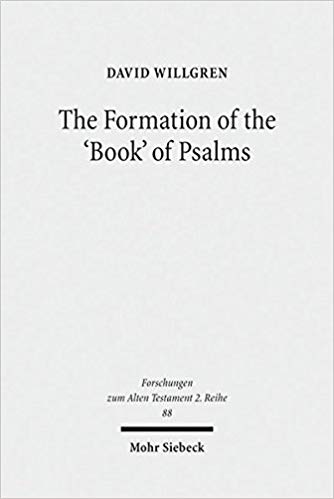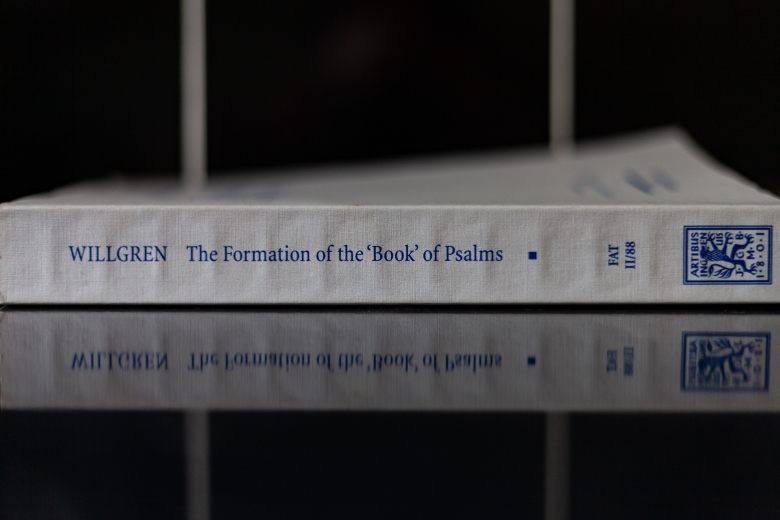theLAB recently had the privilege to interview David Willgren on his excellent recent monograph, The Formation of the ‘Book’ of Psalms (Mohr Siebeck, 2016). In this extended interview, David discusses what led to the writing of his book, a history of research on the formation of the Psalms, and the importance of the DSS for understanding why the Psalms were arranged in the particular order we find them in our Bibles today.
What is the problem you seek to address in The Formation of the “Book” of Psalms that was lacking in the literature to-date?

Ever since the ground-breaking work of Gerald H. Wilson in 1985, research on the formation of the ‘Book’ of Psalms has often taken for granted not only that the process of formation has been in some way intentional, unfolding towards a given goal, but more so that the psalms have been placed in sequence to convey a specific message that relates to certain editorial aims. It could be claimed that the discussion has focused around the two basic questions of “how” and “why” the “Book” of Psalms ended up looking like it does, and that the “why” has been seen as satisfactorily answered by Wilson. Generally, there is an agreement that the so-called “final” form of the “Book” of Psalms provides an interpretive context, a Sitz in der Literatur for the individual psalm. To some extent, consensus is also found as to the “how” question. For example, it is often taken for granted that the “Book” of Psalms has grown out of previously independent collections that are possible to demarcate by analysing, among other things, davidic superscriptions, which are often found in sequences of juxtaposed psalms in the received “Book” of Psalms.
In my book, I attempt to revisit these two questions by contextualizing them in the material and scribal culture of the Second Temple period. Since scholars have generally suggested that some psalms perform specific functions within the collection as a whole, that is, that they function as paratexts, this constitutes one of the main foci of the book. One of the questions I ask is whether the psalms really function in such a way, and I argue that the answer needs to be formulated not only in relation to late medieval manuscripts, where the selection and sequences of psalms is more stable, nor only in light of modern conceptions of books, but related to what is actually seen in the Dead Sea Scrolls, for example. Only then can a more native definition of a “book” be provided. To that end, I propose that the notion of a “book” needs to be further specified, and suggest that the concept of an anthology serves that need.
Ultimately, I attempt to answer the “how” and the “why” by gathering as much data from the Second Temple period as possible: How did anthologies work? How were paratexts interpreted? How did psalms sequences form and stabilize? What is the relation between psalms that ended up in the canonical “Book” of Psalms, and psalms that did not? How were psalms interpreted in this period? How were psalms referred to in this period?
Why did you choose to pursue your research at Lund University, and what was your experience like both there and at Uppsala?
Despite being a small county, Sweden has had some great biblical scholars, and the two universities in Lund and Uppsala have had a significant impact on research on the Hebrew Bible. I started my studies at Örebro School of Theology, and since many of the professors at that school had earned their doctoral degrees at either Lund or Uppsala, it was quite natural to look in that direction as I myself started to think about doctoral studies. For me, that decision came quite late, however. During my studies, I had no thought of pursuing a PhD, but once an opportunity presented itself, I seized it, and have not regretted it since. My supervisor, professor Fredrik Lindström (Lund) is a remarkable scholar and has been very supportive of my process, and this goes also for professor Göran Eidevall (Uppsala), who served as assistant supervisor. Together they welcomed me into academia in the best way possible, and I am very grateful for their feedback and challenges. I am also in debt to the many friends I now have in the two research seminars at Lund and Uppsala. Ultimately, my experience has been very positive, with a lot of stimulating and challenging discussions and warm friendship.
Can you explain for us in brief the concept of Sitz in der Literatur as an interpretive framework for the Psalms, and the influence of Gunkel on psalms interpretation?
Certainly! As I mentioned in the answer to the first question, the study of the “Book” of Psalms has since Wilson proceeded from an idea that the collection is “greater than the sum of its parts.” That is, that psalms have been intentionally juxtaposed to create larger interpretive contexts through which they are now supposed to be read. So, for example, it is seen as significant that Pss 1–2 are provided with a framework and placed first in the collection. As often argued, they now provide the spectacles through which a more informed appreciation of the ‘Book’ of Psalms is enabled. Although scholars debate the specifics of how such interpretive frameworks function, or to what extent they can be identified, the basic concept is almost a consensus view. In some way, this could be argued to be in contrast somewhat to Hermann Gunkel, who did not focus on literary context, but rather related each individual psalm to a Gattung with a possible Sitz im Leben. However, scholars working within the “Wilsonian” paradigm would say that the latter does not supersede, but rather complements the former. Ultimately, Gunkel’s work is presupposed, but where it is mainly applicable to individual psalms (although change in form was instrumental in Westermann’s early attempt to sketch the contours of the formation of the “Book” of Psalms, and more detailed attempts have been made by, for example, Matthias Millard), the focus of the canonical approach to the “Book” of Psalms has its eye fixed on the “book” as a whole.
What does it meant to call the Psalms an “anthology”?
In my study, I argue that it is not precise enough to call the “Book” of Psalms a “book,” since that has no explanatory value in itself. Rather, it is quite open for a number of different interpretations, depending on what the concept of the “book” looks like in any particular context. As I understand it, it is a historically contingent term, and as such, it always needs to be specified: in what way does the concept of a “book” change when we are no longer talking about printed artefacts, but codices, scrolls, or even clay tablets? And what about genre? Needless to say, modern books are read very differently, and so, it is also important to say something about the poetics of the “Book” of Psalms. Consequently, what I attempt to do is to provide a definition that explains what I mean when I call the “Book” of Psalms a “book” (as the reader will see, I intentionally use the word book throughout my study, but within quotation marks, to make the reader aware of the need for a historically sensitive approach), and propose that the concept of “anthology” meets these needs. So put, I do not replace the notion of “book” with anthology, as some reviewers have mistakenly claimed. Rather, I use the concept of anthology to define what I mean with “book.” The bulk of the study is then an inquiry into the way in which the “Book” of Psalms can be understood as an anthology, which I define as “a compilation of independent texts, actively selected and organized in relation to some present needs, inviting readers to a platform of continuous dialogue.”
You use the metaphor of a “flower” to conceptualize “anthology”; how does this help us to grasp the formation of the “book” of Psalms?
As some may know, the word anthology stems from ἄνθος (“flower”) and λέγειν (“to gather”), and so, the metaphor enables to conceptualize the formation of the “Book” of Psalms as more organic, and less linear. Like a garden of flowers, the “Book” of Psalms does not primarily provide a literary context for individual psalms, but rather preserves a dynamic selection of psalms that had proven to stand the test of time and ultimately had come to be regarded, not only as words to God, but as words through which God’s voice could be heard. They had become important sources for the framing of a new hope, the expression of robust protests and far-reaching praises, and for those who entered into this garden, paratexts would provide possible pathways through it, superscriptions provided signs by which individual psalms could be read, and while some psalms were commented upon recurrently, other flowers were rarely picked. In the end, it is in this sense that the “Book” of Psalms can be understood as an intentionally organized selection of psalms, not by being a literary text, but as a multivocal work where each psalm contributes to an ongoing interaction between God and God’s people ultimately hoping that the entire creation would one day join the choir in praise of YHWH, for he is good, for his steadfast love endures forever.
I also illustrate some of the problems with the current “Wilsonian” approach to the formation of the “Book” of Psalms—an approach where an undefined modern “book” concept often makes scholars presume that recurring patterns in the eventually stabilised sequence of psalms are indications of editorial intents to have the reader approach the collection as a “whole”—by using the metaphor of a cook-book. In these books, recipes are often gathered under titles and subtitles, juxtaposed by means of shared contexts of use. Appetizers are clustered together, main dishes put side-by-side and desserts placed in distinct sections. The various titles would, then, in a sense, control the perception of the individual recipes, evoking a sense of relation between recipes gathered in the same section (evidently, if features of a recipe would differ greatly from the others included in a section, it could be judged that it had been misplaced), but it would not imply that two juxtaposed recipes should therefore be mixed together and served as a single dish. Similarly, features of two psalms might have resulted in them being placed side by side, but this should not automatically be interpreted as an indication that they were intended to be read in light of each other.
What is the significance of the Qumran scrolls for our understanding, versus psalms found in codices or books?
The main significance is that the scrolls help us understand how collections of psalms were continuously compiled and reshaped during the Second Temple period. The scrolls were of many different sizes (the notion that the “Book” of Psalms is one of the most popular “books” is misguided; the scrolls do show that psalms were very popular, but not as a “book”), and although some psalms were recurrently transmitted in similar sequences, little interpretive emphasis is placed on such sequences. Instead, the fact that rearrangement was continuing, that superscriptions were continuously added, and that other frameworks (such as the use of Hallelujah) showed variance, while the fact that the text of the psalms themselves is fairly stable indicates that the primary interpretive unit was the individual psalm, and this provides a rich soil in which scholarly work can take place. In the end, the Qumran scrolls show textual stability, but paratextual instability, and since the fixation of the latter is a necessary prerequisite for the idea that the “Book” of Psalms was intended to be read as a redacted whole in the Second Temple period, the scrolls urge scholars to contextualise theories about the formation of the “Book” of Psalms even more and provide necessary tools to counter some of the more teleological tendencies of recent research.
How does anthologization relate to canonization, and why is this important to clarify?
As I relate the terms to the process of formation of the “Book” of Psalms, they are quite overlapping. More specifically, I make a distinction between selection (the conscious decision about which psalms to include in an anthology), and arrangement (the fixation of sequences within the anthology), and argue that the process of canonization primarily relates to selection, and that this is in fact seen in how psalms are used throughout the Second Temple period, not least in the pesharim from Qumran. This would mean, then, that it is the selection of psalms, not their arrangement, that is of primary interpretive importance (contra the ‘canonical’ approach to the “Book” of Psalms). The contents of anthologies are seen to be continuously rearranged (I discuss this in length in my study) without necessarily changing the selection, and in my view, this observation needs to be more firmly situated within the various methodological approaches to the formation of the “Book” of Psalms.
What is the significance of Formation for preaching and teaching the psalms to a modern-day audience?
In light of my own experience both as a preacher and as a professor at a school of theology where most of the students end up as pastors, I must say that many of the aspects brought up in my study do not have any immediate relevance for preaching and teaching to a modern-day audience. However, I think that some areas that I highlight can be of value. The first is the clear conception of psalms as prophetic in the Second Temple period. This not only relates to a select few “messianic” psalms, but to the very idea that they are attributed to David. As understood by the communities of faith in this period, David spoke prophetically about the times in which they were living, and so, psalms were studied as authoritative scriptures. This goes for both the Qumran community as well as, for example, the nascent Jesus-believing communities. Needless to say, the psalms are frequently quoted in the New Testament as authoritative scripture. Understood in such a way, my study can be taken as a renewed call to creative and prophetic preaching and teaching from the psalms. Moreover, the book provides an interesting window into the way scriptures have taken shape, into a time where concepts of authority, authorship, canonicity, scripture, and so on were quite different from how they are conceived today. This could encourage preachers and teachers to explore in a deeper way how psalms have been interpreted in different ways depending on their paratextual framing, and to reflect on the fact that the very act of preaching and teaching is itself a continuing paratextual activity that shapes the interpretation of the text. Ultimately, this could constitute a challenge not to lock the significance and meaning of a text to a posited “original” context, but to explore the ways various communities of faith have interacted with the psalms in the “Book” of Psalms over time.
What impact do you anticipate your work having on future psalms scholarship?
This is a difficult question. I am glad that the book has generated some discussion, and my hope is that the questions I ask will continue to be picked up. Hopefully, they will encourage a more precise use of the term “book” in relation to the “Book” of Psalms. I also hope that the Dead Sea Scrolls will be more integrated in studies of the formation of the “Book” of Psalms, and that paratextual variance will be more accounted for in theories of editorial intent.
What are you working on now, and can we expect to see you at any conferences this year?
I have recently been finishing up a couple of articles related to the questions discussed here. The latest publication would be, “Why Psalms 1–2 Are Not to Be Considered a Preface to the ‘Book’ of Psalms” (ZAW 130/3), but there are a number of articles forthcoming, among others, “A ‘Book’ of Psalms in 4QMidrEschata.b?” (SJOT), and “‘May YHWH Avenge Me on You; But My Hand Shall Not Be against You’ (1 Sam. 24:13): Mapping Land and Resistance in the ‘Biographical’ Notes of the ‘Book’ of Psalms” (JSOT), as well as a couple of book chapters, not least, “A Teleological Fallacy in Psalms Studies? Decentralizing the ‘Masoretic’ Psalms Sequence in the Formation of the ‘Book’ of Psalms,” which will be published in the FAT II series of Mohr Siebeck. I have also recently submitted a chapter on the “Book” of Psalms to the T&T Clark Companion to the Masoretic text, that will hopefully be published this year. So, quite a few publications are happening, and apart from that, I am doing a lot of teaching, and have sent in yet another application for a post-doc position. As for conferences, I plan to go to SBL (Rome and hopefully San Diego), so if anyone who is interested in these fascinating topics want to meet up, just send me an e-mail. I also want to end this interview by thanking you for the opportunity to have my book featured! It is an honor!

David Willgren, PhD, is Lecturer in Old Testament Exegesis at the Academy for Leadership and Theology, Umeå, Sweden.





[…] via The Psalms; a “Book” or “Anthology”? An Interview with David Willgren — theLAB […]
I would like to ask you one question: Which is the rule or practice of psalms for the Judaism today?
Thank you very much!
nice post like it